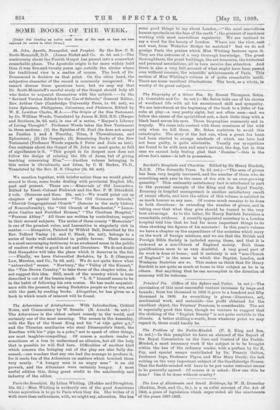SOME BOOKS OF THE WEEK.
[Vidor this indi,, iso natio such Books of lIts wrak as hays not does vossrvs4 for review in other forms.] St. John, Apostle, Evangelist, and Prophet. By the Rev. C. E. Scott-Moncrieff, D.D. (James Nisbet and Co. 4s. 6d. net.)—The controversy about the Fourth Gospel has passed into a somewhat remarkable phase. The Apostolic origin is far more widely held than it was five-and-twenty years ago outside the circles where the traditional view is a matter of course. The book of Dr. Drummond is decisive on that point. On the other hand, the subjective character of the record is commonly recognised. We cannot discuss these questions here, but we may say that Dr. Scott-Moncrioff's careful study of the Gospel should help all who desire to acquaint themselves with the subject.—In the "Revised Version Edited for the Use of Schools," General Editor, Rev. Arthur Carr (Cambridge University Press, ls. 6d. net), we have Ephesians, Philippians, Colossians, and Philemon, Edited by W. K. Lowther Clarke, M.A.—The Origin of the New Testament, by Dr. William Wrede, Translated by James E. Hill, B.D. (Harper and Brothers, 2s. 6d. not), is one of a series, " Harper's Library of Living Thought." Professor Wrede takes the New Testament in three sections : (1) the Epistles of St. Paul (he does not accept as Pauline 1 and 2 Timothy, Titus, 2 Thessalonians, and Ephesians); (2) the Gospels ; (3) Remaining Books of the New Testament (Professor Wrede regards 2 Peter and Jude as late). One sentence about the Gospel of St. John we must quote, so full of significance is it. "This gospel in its deepest core does not follow the design of relating the life of Jesus, but of giving teaching concerning Him."—Another volume belonging to this series is Christianity and Islam, by C. II. Becker, Ph.D., Translated by the Rev. H. S. Chaytor (2s. fid. net).










































 Previous page
Previous page